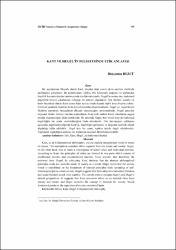Kant ve Hegel'in Felsefesinde Etik Anlayışı
Abstract
Bir aydınlanma filozofu olarak Kant, duyular üstü evreni aklın sınırlan dahilinde açıklamaya çalışmıştır. Bu aydınlanmacı eğilim, etik kavramını doğadan ve toplumdan özerklik kavramı üzerine oturtmasında tezahür etmektedir. Hegel'in sorunu ise, toplumsal değerlerle bireyin çıkarlarının uzlaştığı bir senteze ulaşmaktır. Etik ilkeleri, koşullu ve kesin buyruklar olarak ikiye ayıran Kant için iyi irade dışında hiçbir kesin buyruk yoktur. Evrensel yasaların temelini de bu kesin buyruklar oluşturmaktadır. Hegel ise, soyut felsefi ilkelerin toplumun ihtiyaçlarını dikkate almayacağını savunmaktadır. Hegel gerçekte rasyonel ilkeler üzerine kurulan toplumların, bireylerde sadece kendi çıkarlarına uygun arzular oluşturacağım iddia etmektedir. Bu anlamda Hegel, hem öznel hem de toplumsal özgürlüğün bir arada varolabileceğim ifade etmektedir. Etik kavrayışına yaklaşımı açısından değerlendirildiğinde Kant'm, özgürlüğü toplumdan ve doğadan özerklik olarak algıladığı iddia edilebilir. Hegel için ise amaç, toplum içinde özgür olabilmektir. Toplumsal özgürlüğün anahtarı ise, toplumun rasyonel düzenlenmesindedir. Kant, as an Enlightenment philosopher, tries to explain metaphysical world in terms of reason. This explanation considers ethics separate from the nature and society. Hegel, on the other hand, tries to reach a convergence of social values and individual interests. According to Kant, the principles of ethics are divided in two parts which consist of conditioned maxims and unconditioned maxims. These maxims also determine the universal laws. Hegel, by criticizing Kant, declares that the abstract philosophical principles could not meet the needs of society as a whole. Hegel insists that the society which is established on the foundation of rational principles leads spreading of self- interest principle to whole society. Hegel suggests that both subjective/individual freedom and social freedom could exist together. This article aims to compare Kant's and Hegel's ethical perspectives. It suggests that Kant conceives ethics as an isolated form from society and nature, and Hegel concerns the concept of freedom for society. Social freedom depends on the regulation of society on rational basis.


















